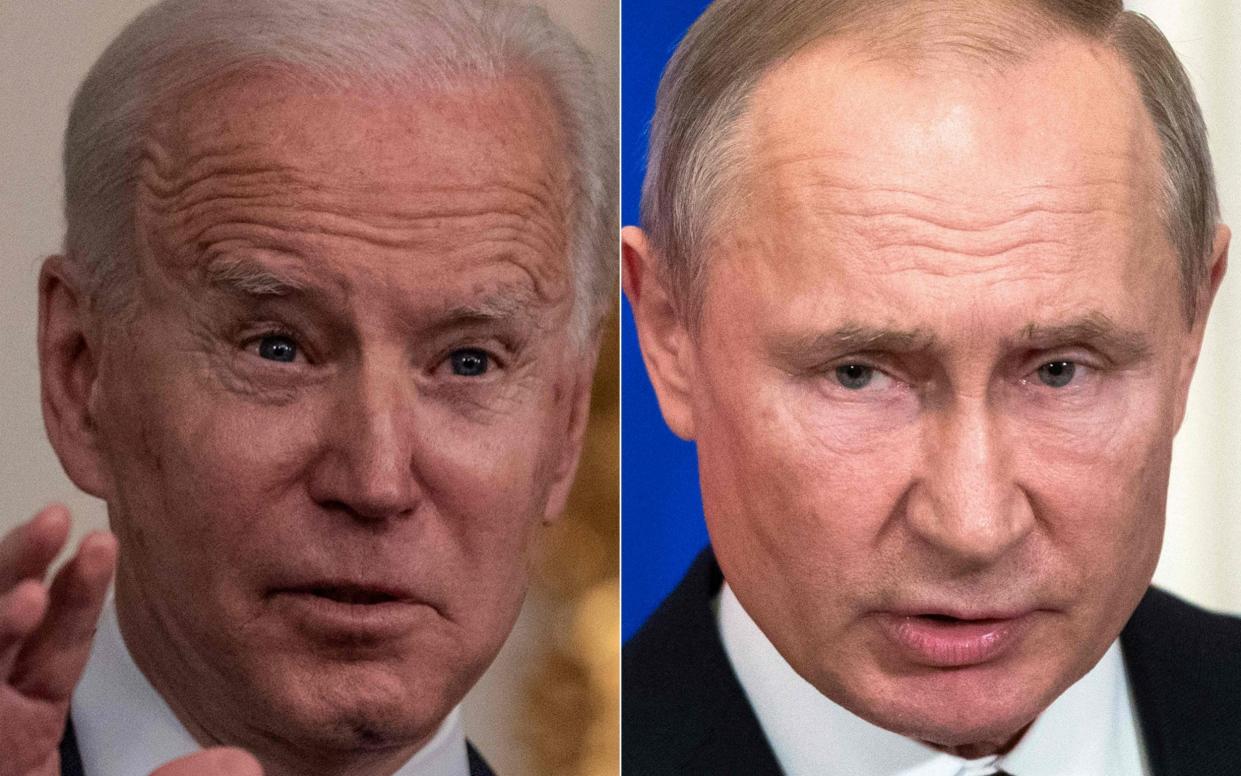Biden-Putin summit could take place as early as June, in test of new US foreign policy

- Oops!Something went wrong.Please try again later.
- Oops!Something went wrong.Please try again later.
- Oops!Something went wrong.Please try again later.
- Oops!Something went wrong.Please try again later.
A summit between Joe Biden and Vladimir Putin could take place within weeks a senior Kremlin aide said on Sunday, in a major test of the new US administration's foreign policy.
“June is being named, there are even concrete dates," Yury Ushakov, who advises President Putin on foreign policy, told the state-run television channel, Rossiya-1.
The prospect of a summit rose barely a month after Mr Biden described the Russian leader as "a killer", triggering a furious reaction from the Kremlin.
Only last week Jake Sullivan, Mr Biden's national security adviser warned of US retaliation if Alexei Navalny, a fierce critic of Mr Putin who was on hunger strike in prison, died.
Other sources of tension have included Russia's cyber-espionage attack against SolarWinds, a major US information technology firm, which gave the hackers potential access to 18,000 government and private computer networks and triggered a fresh wave of US sanctions.
However, despite Mr Biden warning that the Russians would pay a "heavy price" following intelligence reports they had tried to interfere in the 2020 election, tensions between Moscow and Washington have eased in recent weeks with the leaders agreeing to co-operate on tackling climate change.
The US president went out of his way to praise Mr Putin during last week's virtual climate summit.
“President Putin and I have our disagreements, and he’s talking about how you capture carbon from space,” he said.
“It makes overwhelming sense, as much as the president of Russia and I disagree, that two big nations can cooperate to get something done, and this time get something done that benefits everybody.
Potential venues for the summit are already under consideration with Vienna and Helsinki, which hosted the 2018 meeting between Donald Trump and Mr Putin, both offering their services.
Earlier this month Mr Biden, who is planning to attend the G7 summit in Cornwall in June, proposed a face-to-face meeting with his Russian counterpart.
Initially, Moscow had been tight-lipped on the specifics of a possible summit, earlier saying only that the Kremlin would “study” Mr Biden’s proposal.
The conflict in Ukraine will be high on the agenda for both sides, after a build-up of Russian troops near the border sparked fears of an imminent invasion.
Russia recently ordered its troops back from the flashpoint area after what it said were training drills. Analysts suggested the flexing of military muscle could have been an attempt to test the reaction of the Biden administration.
In his state of the nation address last week, Mr Putin warned that there would be a “swift and severe” response if the West were to cross Russia’s “red lines”, without specifying what these boundaries were. He may seek to lay them out in face-to-face talks.
During a phone call this month, the two presidents discussed arms control, the Iranian nuclear programme, the situation in Afghanistan ahead of a US military pullout, and climate change - all issues which would be likely to figure at a summit.
"Expectations will be low, which means the two men may beat them, if they can make even modest progress on issues like the climate crisis," said Fredrik Logevall, Professor of International Affairs at Harvard University's John F. Kennedy School of Government.
"Both men, and especially Putin—his popularity is declining, and the Russian economy is in deep trouble—have incentives to lower bilateral tensions.
"Biden, it seems clear, would like Russian cooperation on matters such as North Korea, the Iran nuclear deal, and working toward stability in Afghanistan."
Mr Biden had been critical of Donald Trump's warmth towards Mr Putin and Prof Logevall suggested the president's team will be warier of the Kremlin than the previous two administrations.
"The history of Moscow-Washington summit meetings during the Cold War suggests that face-to-face meetings of this kind often have beneficial effects, even when tensions are high and no major breakthrough results," he said.

